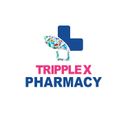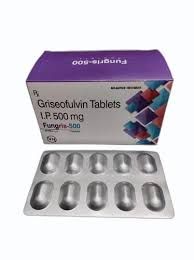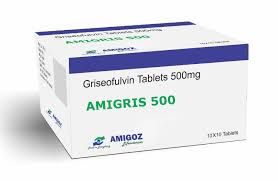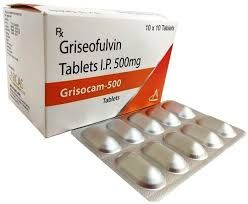Griseofulvin 500mg Tablets are an antifungal medication used primarily to treat various fungal infections affecting the skin, hair, and nails. This medication is particularly effective against dermatophyte infections, which include conditions such as ringworm, athlete's foot, and fungal infections of the scalp and nails.
Key Features
- Active Ingredient: Each tablet contains 500 mg of Griseofulvin.
- Formulation: Available in tablet form, typically packaged in strips of 10 tablets.
Indications
Griseofulvin is indicated for:
- Fungal Infections: Effective in treating:
- Tinea corporis (ringworm of the body)
- Tinea pedis (athlete's foot)
- Tinea cruris (jock itch)
- Tinea capitis (ringworm of the scalp)
- Tinea unguium (fungal infections of the nails)
Dosage and Administration
- Recommended Dosage:
- Adults: The usual dosage is 500 mg to 1000 mg daily, depending on the severity of the infection, taken as a single daily dose or divided into two doses.
- Children: Dosage is typically based on body weight (10 mg/kg/day) and should be determined by a healthcare provider.
- Administration Instructions:
- Take the tablets with a full glass of water, preferably with a high-fat meal to enhance absorption and minimize gastrointestinal discomfort.
Side Effects
Common side effects may include:
- Nausea and vomiting
- Diarrhea or loose stools
- Abdominal pain or discomfort
- Headache
- Dizziness or fatigue
Serious side effects can include:
- Allergic reactions such as rash, itching, or difficulty breathing.
- Severe gastrointestinal issues such as colitis (inflammation of the colon).
If any severe reactions occur, discontinue use immediately and seek medical attention.
Precautions
- Contraindications: Not suitable for individuals with known allergies to Griseofulvin or those with severe liver disease. Caution is advised for patients with a history of alcohol abuse.
- Pregnancy and Breastfeeding: Griseofulvin should not be used during pregnancy due to potential harm to the fetus. Consult a healthcare provider if breastfeeding.
- Drug Interactions: Inform your healthcare provider about any other medications being taken to avoid potential interactions, especially with anticoagulants like Warfarin.





